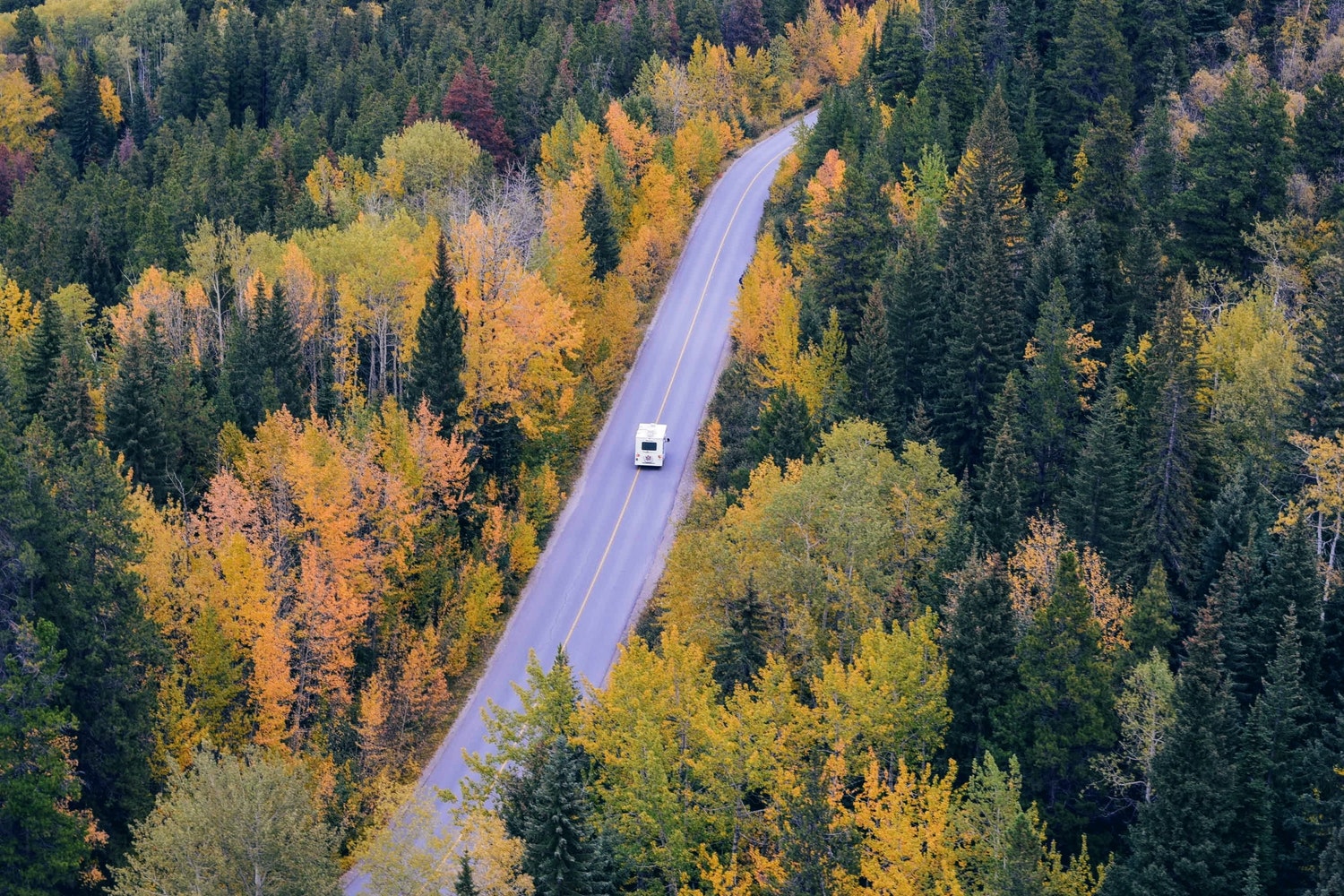How To Plan an RV Trip in 5 Steps

At HereHear, road tripping is our favorite way to get from place to place. Traveling is about so much more than just getting from point A to point B. What makes a vacation memorable is the spontaneous adventures that occur along the ride. It’s not the destination—it’s the journey.
That being said, long stints in a cramped car can present its discomforts. Our solution? An RV, of course.
The RV is a fixture of the American road and one of the most fun and comfortable ways of getting where you need to be. Having your own couch, bathroom, and kitchen on board is not only comfortable, but it’s also a huge time saver.
On top of comfort and convenience, RVing can be one of the most budget-friendly ways to travel. During an RV road trip, you don’t have to worry about paying for hotels or eating out. Plus, with an abundance of options, you will have no trouble finding an RV perfect for your family’s road trip needs.
Whether you’re a veteran RVer or a rookie RV trip planner, we want to make sure your next voyage goes as smoothly as possible. Here are our perfect RV trip planning tips, so you can be an RV trip wizard in no time.
1. Picking an RV
Before you hit the road, you need to get your hands on an RV. There are three types of RVs to consider:
- Class A motorhomes are the biggest. They will provide the most room for you and your traveling companions along with the widest array of luxuries. These luxuries include a private bedroom, a larger bathroom, and a more comprehensive kitchen.
- Class B motorhomes are essentially vans. While they are the easiest to drive, they do not provide ample space for families or larger groups.
- Class C motorhomes offer the best of both worlds. In addition to providing ample room for a family of four, they are also fairly easy to drive and can fit into most campsites.
Once you decide which class of RV suits you the best, it’s time to pull the trigger: should you rent or should you buy?
Each has its pros and cons, so be sure to educate yourself before making a big decision.
Renting an RV
If you’re planning your first RV trip, renting is the way to go. This will allow you to gauge whether or not you like RV travel without making a big financial commitment. There are a few things to keep in mind if you go down this route.
First, you should make your reservation as soon as possible. As RV travel is becoming increasingly popular, many rental companies get booked up fast. So, if you already have your travel dates decided, make your reservation now.
If you’re new to the RV lifestyle, you will want to start with a Class C vehicle. We get that renting a Class A can be very tempting. Those big rigs are the highway equivalent of a five-star hotel. That being said, full-time RVers can tell you they’re about as easy to drive as a school bus. It can be a lot to handle for a first-timer, so start small and work your way up.
Lastly, be prepared for the fees you will face. On top of the rental rate, expect to pay an upfront deposit, insurance, and extra fees depending on the distance or duration of your trip. You can also expect to pay extra for such amenities as linens, kitchenware, GPS, generators, and propane.
Buying an RV
For the frequent RV flier, buying an RV can make a lot of sense. With inflated rates and hidden fees, renting an RV on a regular basis is an expensive habit. That said, owning an RV is no walk in the park.
Here are some things to keep in mind before you make the commitment:
- Repairs are expensive, and mechanics are hard to find.
- Annual maintenance will cost thousands of dollars per year.
- RVs are gas guzzlers, with gas mileage ranging between four and ten miles per gallon.
- Storing your RV can be just as expensive as traveling in it.
Unless you and your family are always on the road, renting an RV is usually the most convenient, cost-effective option. While neither is necessarily a frugal choice, keep in mind that RVs are about the experience above all else—and over time, the amount you save on hotels and other lodgings may be worth it.
2. Mapping Your Route
There are three main factors that determine the quality of a road trip––the people you’re with, the memories you make, and the route you take.
Without a well-planned route, your road trip can go south fast. Make sure to read about some of our favorite road trip routes while planning your next adventure.
A road trip in an RV can be a little more complicated than a standard road trip, though.
Here are some things to keep in mind when planning your RV trip:
3. Budget
With suboptimal fuel economy, increased maintenance costs, and expensive rental fees, RV travel can certainly add up. The silver lining here is that RV travel allows you to save on many things that traditional road trips do not.
One of the best ways to take advantage of this is by cooking your own food. RVs often have kitchenettes or even fully-equipped kitchens, so you can save some cash by nixing costly restaurant bills. Before you embark on your journey, plan out each of your meals. Here are some delicious RV-friendly meals that you can whip up on the road.
You will also want to account for budget when picking your stops, as RV parking rates can also add up. For example, an RV campsite can be more expensive than a traditional campsite.
That being said, some megastore parking lots will allow you to park overnight for free. Just be sure to research local ordinances ahead of time.
4. Pick Your Stops
After you determine your starting and ending points, you’ll need to pick out stops in between. This is another point where RV travel differs from regular travel, as there are a few factors you will want to keep in mind.
First, make sure that your stops are RV-friendly. If you aren’t able to find an RV park along your route for your rig, you will want to look into campgrounds, state parks, and urban parking lots.
RV parks are often the best bet, as they have waste-disposal facilities. Proper waste disposal is imperative for RV trips, so be sure to study up and pack what you need before you hit the road.
When planning your route, you must also keep in mind that RVs are slower than regular cars. Therefore, you don’t want to be too ambitious with your time estimates.
A good rule of thumb is to assume an average speed of 50 mph. This will provide plenty of time for slower speeds and longer gas stops. Knowing which gas stations and truck stops you can hit along the way—and the propane restrictions of your ride—can also help you maximize your fun as you plan your trip.
You will also want to consider exhaustion. If you’ve never been an RV renter before, you will soon realize how physically taxing it can be. RVs require significantly more focus, and rookie drivers can experience some stress. Many RV drivers like to follow the 3/300 rule: No more than 300 miles per day, arriving no later than 3 PM.
5. Consider Your Destination
If you’re on the fence about an RV, one of your first considerations should be the type of road trip you’re taking. Going on a tour of California’s theme parks? Perhaps an RV is not the best fit. In addition to heavy traffic and narrow roads, you will have to rely on RV parks, which can be expensive and limited.
On the other hand, if you’re going on a tour of California’s national parks, then an RV adventure is a perfect choice. Traveling between areas with ample campsites will make for affordable, readily available parking. Even if you’re not much of a camper, keep in mind that you have a hotel on wheels.
Travel in Style With HereHear
If you’re planning your next road trip, springing for an RV rental might be the way to go. Not all road trips have to be roughing it!
Nonetheless, no matter how you travel, a road trip is only as good as your companions. Let Autio be your roadside compadre on your next journey, whether you prefer RV vacations, travel trailers, or luxury resorts.
If you’re looking to step up your road trip game, download Autio on your smartphone and unlock content that will keep you entertained and informed throughout your excursion.
We provide bite-sized stories about the points of interest and roadside attractions you'll find along your journey. Deepen your road trip experience with local legends, historical tales, and wisdom passed down through the generations.
Try Autio today, and discover all of the joys America has to offer.
Sources
Safe Wastewater Disposal for RV, Boat, and Mobile Home Owners and Operators | US EPA
36 Make-Ahead Meals to Enjoy While Camping in Your RV | Taste of Home
